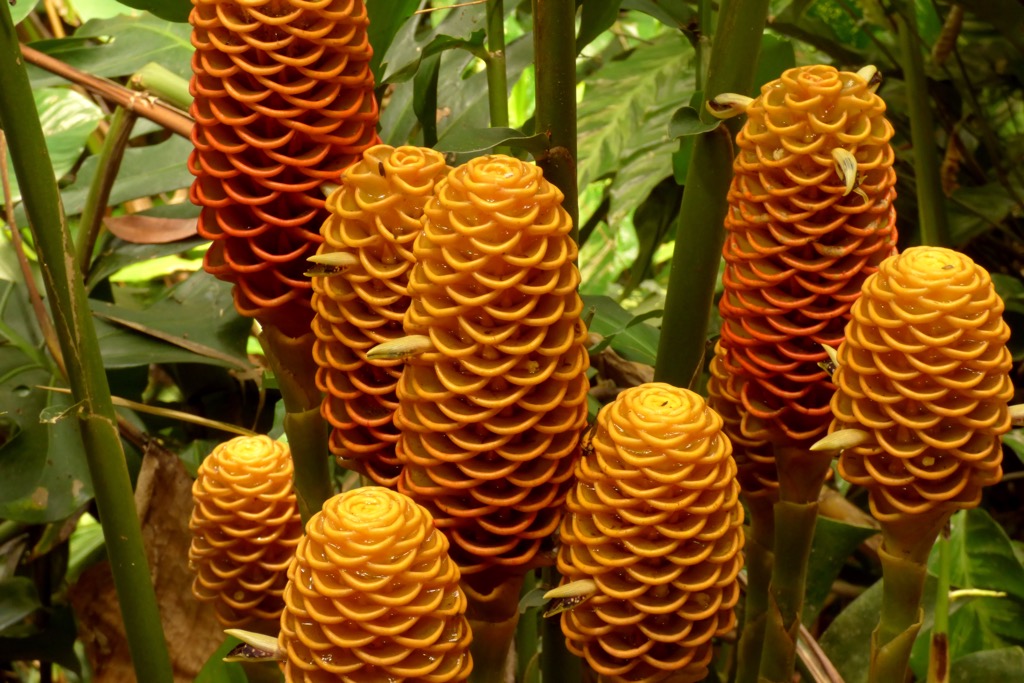
Liberia
Ginger
Zingiber officinale

General Description / Cultural Significance
Liberia is a tropical country on the southwestern coast of West Africa, neighbored by Sierra Leone, Guinea, and the Cote d’Ivoire. The country’s biodiverse landscapes range from coastal plains and rolling hills to mangrove swamps and lagoons. Both indigenous Liberians and immigrants live agrarian lifestyles, cultivating rice and cassava among other cash crops. The spicy scent of the aromatic, perennial Ginger plant, Zingiber officinale, which grows naturally in Liberia as underground rhizomes, is particularly meaningful to these Liberians. Many add Ginger to their rice-based dishes and enjoy its distinctive flavor in the form of a particularly strong Ginger Beer. Ginger contains many compounds, both nutritional and medicinal. It is used across the country as medicine to treat a range of conditions due to its antimicrobial activity. The oil from Liberian Zingiber officinale is dark in color and used by local peoples to aid in digestion, mitigate arthritis pain, and to scent perfumes and cosmetics. Zingiber officinale is proven to treat dysentery, loss of appetite, coughs, and bronchitis. Liberians have publicly promoted therapeutic knowledge about a health drink which includes extracts of Ginger, lime, and garlic. Traditionally used to treat symptoms of a cold, the COVID-19 pandemic has revealed that the mixture makes for a natural, therapeutic treatment of coronavirus symptoms. This has increased the already prominent use of Ginger in Liberia, and the high demand for the root has caused prices to sky rocket. Questions about the utilization, exploitation, and conservation of Zingiber officinale are now mounting.
Climate Change / Conservation Status
After a civil war that lasted from 1989 to 2003, Liberia was left to grieve hundreds of thousands of lost lives, a crumbling economic infrastructure, and an uprooted population. This left the country particularly vulnerable to the warming temperatures, increased rainfall, and flooding as a result of climate change. Sea level rise now threatens the country’s coastal ecosystems and increasing temperatures are leading to pest infestations that decrease the soil quality in Liberia’s rainforests. It is here in rainforest ecosystems where Zingiber officinale grows. Most Zingiber species already suffer from ever encroaching urbanization and deforestation. A keen understanding of sustainable agricultural practices and proper cultivation methods in the face of increased medical need is critical to preserve the health of the Ginger plant, an economically important crop and cultural staple for Liberia which now faces increased conservation threats.
Alternate Names
Singabera (Sanskrit)
Sources
Büttikofer, J., Dop, H. & Robinson, P.T., 2013. Travel sketches from Liberia: Johann Buttikofer’s 19th century rainforest explorations in West Africa, Leiden: Brill.
Country Reports, n.d. Liberia Geography. CountryReports. [website]
Dahn, M., 2021. Liberians troop for lime, garlic and ginger as alternative treatment for Covid-19. Liberia Public Radio. [website]
The Editors of Encyclopaedia Britannica, 2021. Ginger. Encyclopedia Britannica. [online]
Food in Every Country, n.d. Liberia. Advameg, Inc. [website]
Huang, Z., et al., 2019. Geographic Distribution and impacts of climate change on the suitable habitats of Zingiber species in China. Industrial Crops and Products, [website] 138. DOI: 10.1016/j.indcrop.2019.05.078
Jank, J.K., 1924. Spices: Their botanical origin, their chemical composition, their commercial use. seeds, herbs, leaves, etc.: Their botanical origin, their commercial use. miscellaneous: Technical advices and tables, Andesite Press, New York: Spice Mill Pub. Co. ISBN-10: 1376302608
Office of the Ambassador, Embassy of Liberia, Washington, D.C. This statement can be found on the World Sensorium original website.
Prasad, S. & Tyagi, A.K., 2015. Ginger and Its Constituents: Role in Prevention and Treatment of Gastrointestinal Cancer. Gastroenterology Research and Practice, 2015, pp.1–11. DOI: 10.1155/2015/142979

